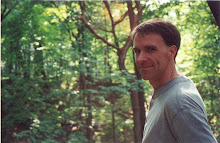
In the artsy Carytown section, I geared up for sightseeing with a latte at a sidewalk café and interviewed one of its workers. Evan was tall and in his early 20s, with a serene face, blond hair pulled back behind bushy sideburns, and a close-cropped beard, and his sandals completed the effect of making him look like a taller, beefier Jesus.
"They're definitely segregated," he answered my question, his blue eyes catching mine. "Coming from a Bible Belt town in Tennessee, I thought it'd be better because this is a little further north. But it's in fact a little worse."
He sidled up and puffed his cigarette. I felt a parable coming on. "Ever heard of Oregon Hill? That's where I moved when I first moved here. It is predominately white; rebel flags in windows everywhere. But the other side is Hollywood Cemetery, where some of the dead presidents are buried and Confederate 'heroes,' so to speak: beautiful gravestones, beautiful cemetery.  Then on the other side of that, there's a barbed wire fence, and then there's this dirty, worn-down cemetery where there are a lot of black families buried. Then on the other side of that is Randolph, which is a predominately black community. That's sort of symbolic of the town. The past people are separating the present people.
Then on the other side of that, there's a barbed wire fence, and then there's this dirty, worn-down cemetery where there are a lot of black families buried. Then on the other side of that is Randolph, which is a predominately black community. That's sort of symbolic of the town. The past people are separating the present people.
"Everyone knows it's still a problem, and there's people still fighting to have their rebel flags in their cars or in their workplace. A lot of people who had their family members in the Civil War want to remember their families, but they're possibly not doing it in the most positive way and the most beneficial way to everyone around them. On the other side of that, there's people arguing, 'this is ridiculous. Move on, son.' I mean, are you familiar with Monument Avenue?"
"I read that the Arthur Ashe monument caused a furor here," I told him.
"Yeah," he snorted. "It's the only one facing north. Even though that's kind of a saving grace of that street, it's still very obvious that it was an official thing to put up this monument. To make the street look a little better, less white."
"People are not isolated because they're in communities, but the communities themselves are isolated from one another. In the Bible Belt where I came from, everybody's nice to each other. But even in that, there's a sense of artificiality. For me, the isolation I find in Richmond was the isolation I found in any big city, and I've been to London, Chicago, New York, Baltimore. The larger a city gets to be, the more isolated. It's just as isolated as any place is."
20090603
263 Richmond, VA: Gospel Truth
Subscribe to:
Post Comments (Atom)




No comments:
Post a Comment